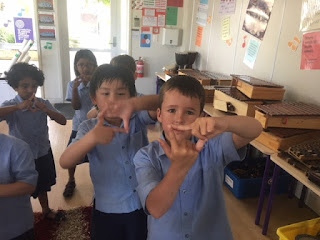Snap It:
This is an activity that children can work on in groups.
Each child makes a train of connecting cubes of a specified number. On the signal “Snap,”
children break their trains into two parts and hold one
hand behind their back. Children take turns going around the circle showing
their remaining cubes. The other children work out the full number combination.
For example, if I have 8 cubes in my number train I could snap it and
put 3 behind my back. I would show my group the remaining 5 cubes and
they should be able to say that three are missing and that 5 and 3
make 8.







